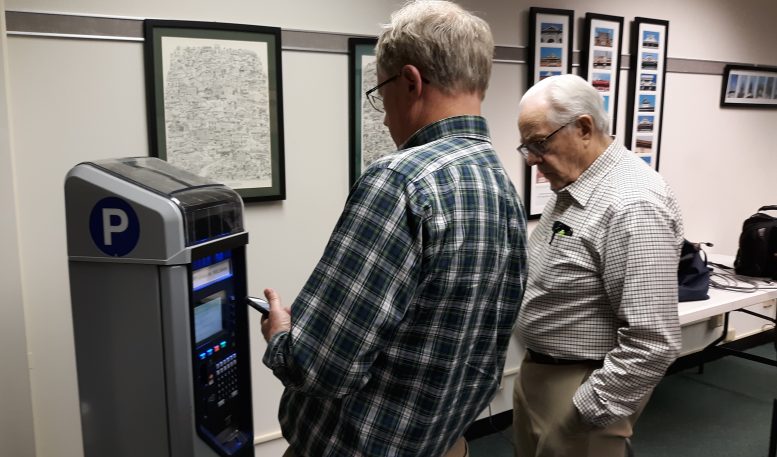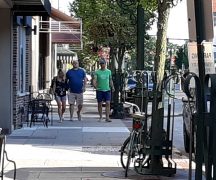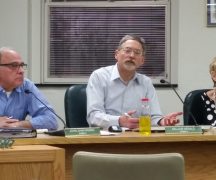By JAN LARSON McLAUGHLIN
BG Independent News
One by one, the business owners and city officials took turns trying a different type of parking kiosk that promised to be easy to use, faster for patrons, and less likely to cause frustration for shoppers.
The sample kiosk, presented recently by International Parking Solutions, was promoted as taking less than 10 seconds to use. But as with most technology, human error and uncertainty sometimes stretched out the time.
Bowling Green Police Chief Tony Hetrick, whose staff patrols the city parking lots, said the kiosks used in the lot behind Panera were “not well received.”
The city and a parking task force is considering several downtown parking options – including the replacement of the current kiosks with new easier models.
“You want to make it as convenient as you can,” said Michael Wilson of IPS.
The new sample kiosk proved to be easier – since it allows users to pay in a variety of ways with a variety of paths to get there. Unlike the existing kiosks, this one does not send the motorist back to square one if a step is missed.
“If this takes you longer than 10 seconds, it’s too long,” Wilson said.
But there are some problems with the IPS kiosk. It will accept credit cards or coins – but programming it to accept dollar bills costs an extra $1,500 per kiosk. Motorists who frequent the lots can go online and register their credit card to streamline the process more.
Like the current kiosks in use, the IPS model also notifies motorists on their phones of their parking time nearing expiration. The motorists can then ask for more time.
“The revenue side of parking is critical to cities,” Wilson said. It’s often that money that is used to maintain city parking lots and sidewalks, he said.
The average minimum parking cost in cities is $1 an hour. Anything less than $1 is not work the credit card processing, Wilson said.
Costs in larger communities are much higher, like $2.75 an hour in Madison, Wisconsin, and $6.50 an hour in San Francisco, he added.
Kim Thomas, owner of the H&R Block building on South Main Street, said the parking issue is more complicated than it appears.
“Of course, free parking sounds wonderful,” she said.
But the fact that several downtown apartment renters use city parking lots for their vehicles means that some time limits still need to be enforced so parking spots rotate for shoppers and diners.
“Whatever we do, we want it enforced,” Thomas said.
Assistant Municipal Administrator Joe Fawcett said while free parking sounds good, the time limits must be enforced. The downtown will not seem so “friendly” when motorists get $15 tickets for overstaying their time in parking spots, he said.
But some store owners feel their businesses are hurt by the city charging for parking.
Ben Waddington, of Waddington Jewelers, said he frequently hears from customers who don’t like the parking kiosks.
“Nobody wants this,” he said of the downtown kiosks.
City Council President Mike Aspacher agreed downtown parking is a “multi-layered issue.” He has heard the complaints about the kiosks, and said no decisions have yet been made on the parking issue.
Floyd Craft, owner of Ben’s and Ace Hardware, agreed the parking problem won’t be simple to solve.
“We need parking and we need enforcement,” he said.
“I think we need to look at the modern way,” Craft said after trying out the sample kiosk. “You’re never going to make everyone happy. We love the customers, but we have to maintain the lots.”
“There’s no perfect answer to this,” Craft said. “But if you aren’t careful with free parking, you’ll have no parking.”
Eventually, motorists will become accustomed to the kiosks, Craft said.
“I’m sure there was the same problem when they got the parking meters,” he said.
Numbers from the city show that motorists are becoming more accepting of the kiosks – though slowly. To date, the city lot with kiosks has had 39,528 “transactions” in 2018 – or on average, 3,953 per month. This is an increase from 38,452 transactions compared to this time last year.
A committee of downtown property owners and business owners has been meeting to study the options of how to pay for parking. The committee is charged with looking at whether the city should continue to charge for parking, or if the property and business owners want to work on a shared cost approach.
The cost of parking meters will double in the downtown area if a solution isn’t found.
The problem is that the city isn’t making enough from its downtown parking meters to pay for repaving the lots and enforcing parking rules. But the fear is that doubling parking costs will discourage customers from patronizing downtown businesses.
The city’s downtown lots – with their 600-plus parking spaces – are struggling due to flat revenue, increasing costs and aging infrastructure.
Under a shared cost program, the downtown property owners would be assessed based on their front footage and the benefits to their parcels. The average property owner would pay $220 a year for 20 years. The lowest amount charged would be $30 a year. The highest – to the owner of multiple properties – would be $2,000 a year.
Those assessments would generate about $20,000 a year.
The concept of the downtown property owners picking up the tab for parking expenses was not supported by the landowners during a meeting earlier this year. However, the business owners have stated they would be willing to share in the expenses if it meant customers wouldn’t have to pay for parking.
The benefits of getting rid of parking meters would be multi-faceted. It would be a marketing opportunity for downtown businesses, it would eliminate the need for meter or kiosk replacements, and it would mean the city would no longer have to pay property taxes on the parking lots since they would not be generating revenue. That alone will be an annual savings of about $35,000.





